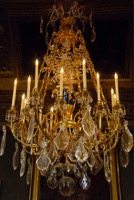Difference between revisions of "Chandelier"
m (Text replacement - "http://" to "https://") |
|||
| Line 3: | Line 3: | ||
==Origin== | ==Origin== | ||
French, from Old French, candle holder, modification of [[Latin]] ''candelabrum'' | French, from Old French, candle holder, modification of [[Latin]] ''candelabrum'' | ||
| − | *[ | + | *[https://en.wikipedia.org/wiki/18th_century 1736] |
==Definition== | ==Definition== | ||
*1: a branched often ornate [[lighting]] fixture suspended from a ceiling | *1: a branched often ornate [[lighting]] fixture suspended from a ceiling | ||
| Line 11: | Line 11: | ||
The earliest candle ''chandeliers'' were used by the [[wealthy]] in [[medieval]] times, this type of chandelier could be moved to different rooms. From the 15th century, more [[complex]] forms of chandeliers, based on ring or [[crown]] [[designs]], became popular decorative features in palaces and homes of nobility, [[clergy]] and merchants. Its high cost made the chandelier a [[symbol]] of [[luxury]] and [[status]]. | The earliest candle ''chandeliers'' were used by the [[wealthy]] in [[medieval]] times, this type of chandelier could be moved to different rooms. From the 15th century, more [[complex]] forms of chandeliers, based on ring or [[crown]] [[designs]], became popular decorative features in palaces and homes of nobility, [[clergy]] and merchants. Its high cost made the chandelier a [[symbol]] of [[luxury]] and [[status]]. | ||
| − | By the early 18th century, ornate cast [ | + | By the early 18th century, ornate cast [https://en.wikipedia.org/wiki/Ormolu ormolu] forms with long, curved arms and many candles were in the [[homes]] of many in the growing merchant class. [https://en.wikipedia.org/wiki/Neoclassicism Neoclassical] motifs became an increasingly common element, mostly in cast metals but also in carved and gilded wood. Developments in [https://en.wikipedia.org/wiki/Glass glassmaking] later allowed cheaper production of lead crystal, the light scattering properties of which quickly made it a popular addition to the [[form]], leading to the crystal chandelier.[https://en.wikipedia.org/wiki/Chandelier] |
[[Category: General Reference]] | [[Category: General Reference]] | ||
Latest revision as of 23:45, 12 December 2020
Origin
French, from Old French, candle holder, modification of Latin candelabrum
Definition
- 1: a branched often ornate lighting fixture suspended from a ceiling
Description
A chandelier is a decorative ceiling-mounted light fixture. Chandeliers are often ornate, and normally use lamps. Crystal chandeliers have more or less complex arrays of crystal prisms to illuminate a room with refracted light.
The earliest candle chandeliers were used by the wealthy in medieval times, this type of chandelier could be moved to different rooms. From the 15th century, more complex forms of chandeliers, based on ring or crown designs, became popular decorative features in palaces and homes of nobility, clergy and merchants. Its high cost made the chandelier a symbol of luxury and status.
By the early 18th century, ornate cast ormolu forms with long, curved arms and many candles were in the homes of many in the growing merchant class. Neoclassical motifs became an increasingly common element, mostly in cast metals but also in carved and gilded wood. Developments in glassmaking later allowed cheaper production of lead crystal, the light scattering properties of which quickly made it a popular addition to the form, leading to the crystal chandelier.[1]
